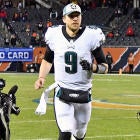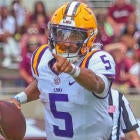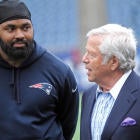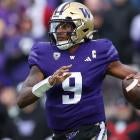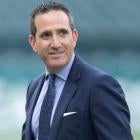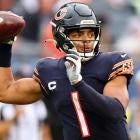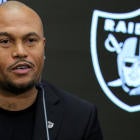The start to the playoffs has taken on an eerie resemblance to the postseason following the 2013 NFL season. Philip Rivers went on the road and won as a wild card, the Chiefs and Colts could face off in an epic game and Nick Foles is playing the Saints. I might just be sentimental: my son was born that weekend and I distinctly remember soaking in an incredible Wild Card Weekend that gave way to the first-seeded Seahawks dominating the first-seeded Broncos in the Super Bowl.
That was the first season for a long stretch -- a full half-decade -- where chalk dominated the bracket, with top seeds repeatedly advancing to the Super Bowl. Maybe it's a somewhat symmetrical way of easing out of that stretch (the Colts and Chiefs actually met in a bananas wild-card matchup with a historical comeback by Andrew Luck in his last playoff appearance), and perhaps we'll get some wild card magic, the way we did in the early part of the decade, when top tier quarterbacks like Aaron Rodgers, Ben Roethlisberger and, yes, even Eli Manning and Joe Flacco were heating up in the postseason and carrying their teams.
Let's look at some of the storylines from a memorable playoff weekend. If you want it all recapped in audio form, make sure and subscribe to the Pick Six Podcast, a daily NFL show hosted by yours truly.
Nick Foles is a playoff zombie
If I told you Mitchell Trubisky completed 60 percent of his passes, didn't have a single turnover against the Eagles and became the first Bears quarterback ever to throw for 300 yards in a playoff game, how many points would you guess Chicago ended up winning by? 10? 14? Bad news Bears: they lost, and they lost in absolutely brutal fashion, with Cody Parkey double-doinking a would-be game-winning field goal that would have sent the Bears to Los Angeles to play the Rams. Instead, they're going home.
Upright. Crossbar. Out. pic.twitter.com/nWtpr4LyGB
— The Checkdown (@thecheckdown) January 7, 2019
It's a brutal way to lose if you're the Bears, especially considering the defense held the Eagles to 16 points (below the Bears' season average of 17.7 points per game allowed). And it's even more brutal for Parkey, who was literally booed off the field by Bears fans in his home stadium.
Cody Parkey left the field to this 🔊 (via @diannaESPN)pic.twitter.com/GKlNPEjLsY
— NFL on ESPN (@ESPNNFL) January 7, 2019
I get how easy it is to uncork boos on someone for screwing up, even when they play for your home team. I'm not going to suggest people should stop booing all the time (I will suggest people stop booing a little later in this column though). But I would like to ask people, if you read this, to go send a nice note to Cody Parkey on social media (his Twitter handle is @CParkey36). The dude just wants to go home and see his wife and dog and he's still sitting there, answering the questions, despite the lowest moment of his professional career.
As it turns out, the kick was actually tipped. If you don't believe me, just ask Eagles defensive end Chris Long. Or the man who tipped it, Treyvon Hester. If you don't believe him, how about some video evidence?
All-22 footage clearly shows Treyvon Hester got a piece of Cody Parkey’s final FG attempt vs. Eagles. pic.twitter.com/kAZdjdXug4
— Nick Shook (@TheNickShook) January 7, 2019
Anyway, chalk this up to more of the Eagles' incredible luck when it comes to the playoffs. Maybe luck is the wrong word. The Eagles' incredible "mojo?" These guys have been underdogs in their last four playoff games and they've won each and every one of them. This might have been the toughest challenge: this is not the same Eagles team as last year, they did not have homefield advantage and they went up against the best defense they've seen in this incredible two-year run.
Foles was not some elite monster in this game. He wasn't really that good. But he just made plays when they counted. Doug Pederson had plays in his pocket when he needed them. The defense came up with huge stops on third down, and Alshon Jeffery and Zach Ertz were moving the chains constantly on third down. The Eagles went 7 for 14 on third and fourth downs, while the Bears went 5 for 16.
The Bears put a bunch of pressure on Foles, but he was only sacked once. He got the ball out faster than he had all season long. Philly averaged 1.8 yards per rush and it still felt like Wendell Smallwood was picking up big runs when he needed them. Once the Bears let the Eagles hang around, it should have been more obvious what was going on. Foles was going to find a way to win this matchup. And he did.
The Eagles are enormous nine-point underdogs to the Saints next week. I get it. But New Orleans better not let them hang around.
Rivers' revenge
For anyone who's ever spent four hours watching a Philip Rivers football game -- whether in the NFL or in college -- the waning minutes of the Chargers' 23-17 win over the Ravens felt very familiar, and not in a good way. The Chargers were snuffing out Baltimore, winning 23-3 and people were checking out on the game, just sort of playing out the string and having debates about Joe Flacco vs. Lamar Jackson (more on that in a second). Then all of a sudden Lamar Jackson hit Michael Crabtree for a bomb down the field to cut the lead to 13.
At this point in time, I started to point out to anyone who would listen (my co-workers in Slack, Twitter, my friends on a text thread, my wife, my dog, all of whom ignored me) that this game was closer than it needed to be. I'd seen the movie, and I wasn't wrong -- the Ravens got the ball back late and Jackson, who'd been moving the ball effectively, had a chance to win. He'd fumble (that's a problem for him) and the Chargers would win, but not without making everyone sweat.
The Chargers' win on Sunday wasn't about Rivers so much as it was about Gus Bradley and the defense adjusting to a run-heavy offense they'd seen less than three weeks ago. The Chargers created multiple turnovers, never allowed the rushing game to get going and did it in surprising fashion: per Next Gen Stats, the Chargers used seven defensive backs on the field on an absurd 58 of their 59 defensive snaps Sunday. No NFL team used seven defensive backs on more than 18 snaps in a game this season and the Chargers used seven defensive backs on just 50 snaps all season. In other words, tip your cap to Bradley and the coaching staff.
"If you're used to rushing the ball for 300 yards a game and we hold you to 90, yeah, I would get flustered," Anthony Lynn said after the game.
Defensive end Joey Bosa added "after watching a couple more weeks of film" and being able to dive back into the Chargers-Ravens matchup from a few weeks ago gave them a huge edge. How could it not? The Ravens went 6-1 to close the season, and probably got unlucky with the draw against the Chargers, a team with a good defense that had seen them recently.
Things get serious for the Chargers pretty quickly: they're headed to face the Patriots in New England where they're 4.5-point underdogs.
Rivers is a depressing 0-7 all time against Tom Brady and the Patriots, although he did beat Bill Belichick and Matt Cassel by 20 points in 2008. It's been over a decade since the teams squared off in the postseason, which is a reminder of just how good Belichick and Brady really are -- Rivers and the Chargers were one of the bigger rivals in the AFC back in 2006 and 2007 and faded from deep playoff relevance for the better part of a decade.
The last time they played, the behemoth 2007 Patriots handled the Chargers 21-12 in fairly ho-hum fashion in the AFC Championship Game. The undersold story of that game? Rivers played it without an ACL. He tore his ACL the week before beating the Colts in the playoffs and proceeded to play against the Pats anyway and keep it kind of close. He never missed a game, by the way. It's the most impressive recovery from an ACL tear in NFL history that no one talks about.
Rivers will represent by far the toughest quarterback the Patriots have seen in their absurd run of hosting a divisional-round game after a bye. Previously they've beaten Marcus Mariota, Brock Osweiler, Alex Smith, Joe Flacco, Andrew Luck (second year), Matt Schaub and Tim Tebow since they last lost a divisional-round game. This is going to be a fun game.
Shove your boos
Not to circle back on the Ravens game, but it appalled me to hear Ravens fans booing Lamar Jackson and their offense late in a game against the Chargers. Baltimore's offense looked sloppy. They'd scored just three points at the time. Joe Flacco was sitting on the sideline. CBS cameras were cutting to him every five seconds. I get it. People wanted to see Flacco. There's an argument for putting him in and hoping he can generate some yardage through the air.
John Harbaugh declined to comment on Flacco's status at halftime, but it was clear he considered putting him under center, although after the game Harbaugh said that Lamar "is our quarterback."
That's the thing: how can you bench your first-round pick when he's starting a playoff game as the youngest quarterback in NFL history to do so? It's not like Jackson is some savvy vet with a ton of experience. And it's not like Flacco, even with all of his great playoff experience, was going to slide into the starting lineup and just light up the Chargers defense. Los Angeles was getting tons of pressure on Jackson and putting him on his back repeatedly. Flacco's a statue. He wasn't going to win that game for the Ravens.
Let's not forget his first playoff game either -- he completed less than 40 percent of his passes and threw for less than 150 yards. Jackson had a better debut, even if a lot of his yardage came in junk time and he lost, while Flacco won.
Harbaugh also couldn't have benched Jackson, lost the game and expected to return to the Ravens next year. If he wants to work out an extension, he's going to do so by explaining how he can help develop Jackson into the future at quarterback for the Ravens.
It wasn't on the table to throw Flacco in once the Ravens blocked a field goal on the Chargers' first possession after halftime. They were going to run The Jackson Show and see how it worked. It nearly resulted in a comeback. Booing the future of the franchise, in that spot? Be better, Baltimore.
The Dallas formula?
Saturday night was a remarkable affair between the Seahawks and Cowboys, especially for anyone who sat around complaining about the excitement of the Chiefs-Rams matchup in the regular season. What stood out to me -- and I'm not alone here -- was the Seahawks' inability to adjust to Dallas's stout run defense.
Over and over, Brian Schottenheimer would call for the Seahawks to run on first down. They would get stuffed. And then he would call for the Seahawks to run on second down. They would get stuffed. And then they would pass on third down, not pick up a first down and eventually punt and try to play defense.
Just twice, once at the end of the first half and once at the end of the game, did the Seahawks open things up and let Russell Wilson throw down the field. When they did it, Seattle moved the ball. The Seahawks averaged three yards per carry and 8.1 yards per pass attempt. Despite that, they ran the ball almost as many times (24) as they threw the ball (27).
I don't need to relive the bad beat for anyone who bet on Dallas -2.5 -- the Seahawks lost kicker Sebastian Janikowski and went for two multiple times, including when down four with just a minute and change left in the game -- because I'd rather focus on this matchup between the Cowboys and Rams next week.
Los Angeles is a seven-point favorite, which stuns me. The Rams want to run the ball with Todd Gurley, and Dallas is really good at stopping the run. The Rams aren't great at stopping the run and the Cowboys love to run Ezekiel Elliott. As much as Amari Cooper changed the Cowboys offense and made Dak Prescott more efficient, his addition helped to turn Elliott into a monster down the stretch.
Sean McVay's a better offensive mind than Schottenheimer, so what's his move here? Does he come out firing with Jared Goff? Can he neutralize the Cowboys' front seven by taking shots down the field to Brandin Cooks? The Rams' passing game hasn't been as dominant since it lost Cooper Kupp a few weeks ago.
This is a fascinating chess match to me, almost as fascinating as the revenge potential for Wade Phillips against Jason Garrett and the Cowboys. Garrett, if you don't remember, took over for Phillips when Jerry Jones canned Wade a while back. There's some spice here.













